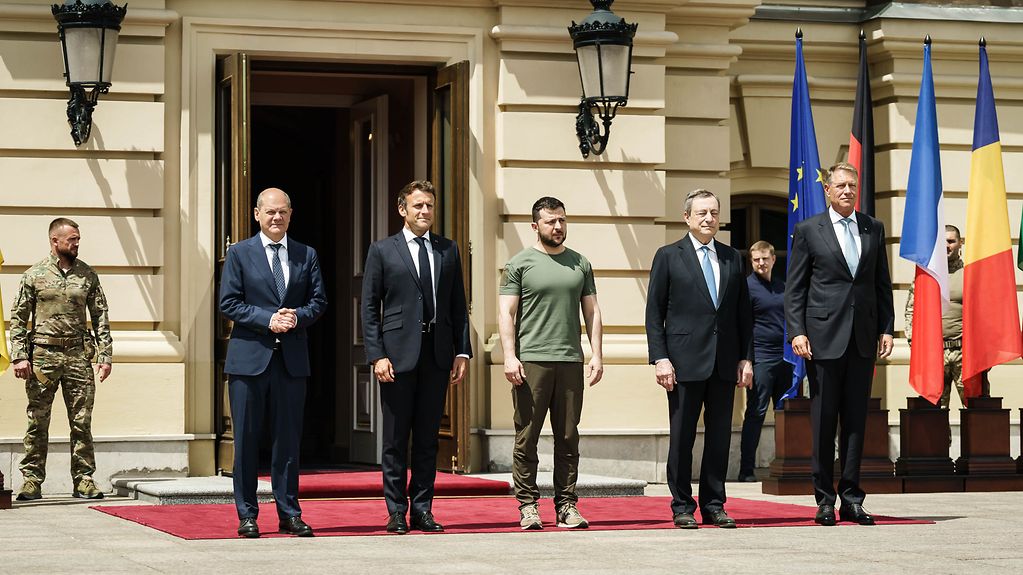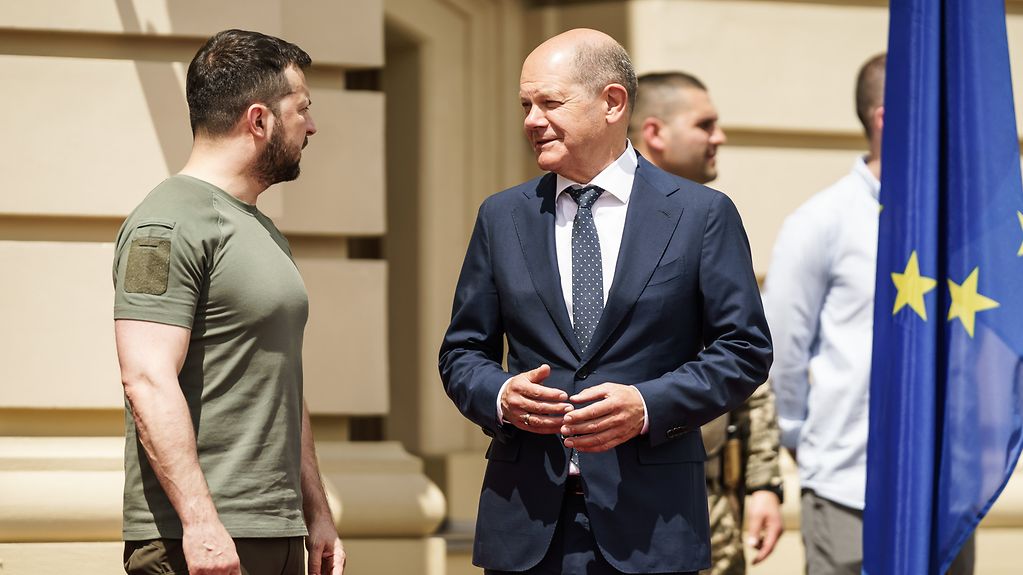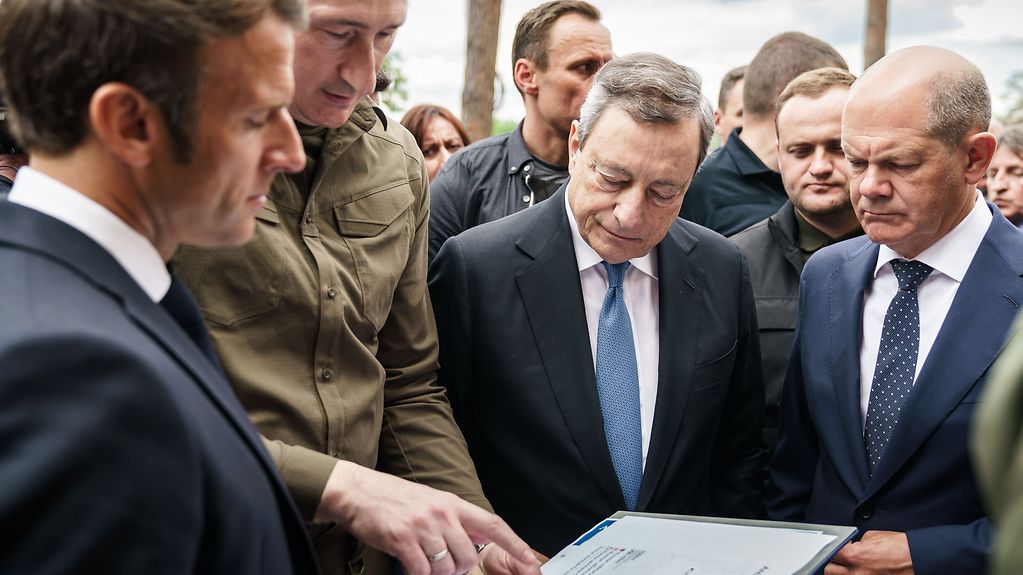Federal Chancellor Scholz in Kyiv
Federal Chancellor Scholz met Ukrainian President Zelensky in Kyiv and stressed his continued support for the country in its defensive struggle against Russia. In addition, he said, he would push for Ukraine to be given the status of an EU candidate country. Visiting the suburb of Irpin, Federal Chancellor Scholz expressed his shock at the destruction he saw there.
4 min reading time

Federal Chancellor Scholz deliberately visited the Ukrainian capital together with EU partners.
Photo: Federal Government/Denzel
In Kyiv, Federal Chancellor Scholz expressed his support for granting Ukraine the status of an EU candidate country. “My colleagues and I came here to Kyiv today with a clear message: Ukraine belongs in the European family,” said Scholz. At the European Council next week, Germany would seek to push for a positive decision in favour of Ukraine as a candidate for EU membership, the Federal Chancellor stressed.
Scholz travelled to the Ukrainian capital on Thursday together with French President Emmanuel Macron, Italian Prime Minister Mario Draghi and Romanian President Klaus Johannis. There they met with the President of Ukraine, Volodymyr Zelensky, for extensive talks.
Scholz expressed his respect for the Ukrainian people and President Zelensky: “Ukraine has been engaged in an heroic defensive struggle against Russia for 113 days. Its soldiers have demonstrated immense bravery,” said the Federal Chancellor. He said it was admirable how the Ukrainians were fighting back against Russia’s invasion.

Federal Chancellor Scholz in conversation with Volodymyr Zelensky.
Photo: Federal Government/Denzel
Standing closely by Ukraine’s side
Russia was trying to use force to shift borders in Europe, said the Federal Chancellor. “This is unacceptable, which is why Germany – together with many other countries in the world – has stood closely by Ukraine’s side from day one,” said Scholz.
Germany was providing both financial and humanitarian support for Ukraine in defending its sovereignty and territorial integrity, said the Federal Chancellor. “And Germany has broken with a long tradition: we are also supplying weapons to Ukraine and we will continue to do so as long as it needs this support,” said Scholz. As an example, he cited the modern Iris-T air defence system, which he said was capable of defending an entire large city against air attacks.
The Federal Chancellor also expressed his delight that the Ukrainian President had accepted the invitation to attend the G7 Summit at Schloss Elmau.
“A sobering reminder”
Visiting the Kyiv suburb of Irpin earlier, Federal Chancellor Scholz condemned the brutality of Russia’s war of aggression. Scholz was able to gain a first-hand impression on site, together with President Macron, Prime Minister Draghi and President Johannis. Innocent civilians had been hit and houses destroyed, said Scholz, noting that an entire city had been destroyed in which there had been no military structures at all. “This says a lot about the brutality of the Russian war of aggression, which is simply bent on destruction and conquest.” The destruction in Irpin stood as a “sobering reminder” that something needed to be done.

Together with President Macron and Prime Minister Draghi, the Federal Chancellor takes a look at the destruction in Irpin.
Photo: Federa Government/Denzel
Federal Chancellor Scholz deliberately visited the Ukrainian capital together with EU partners: “The heads of government of the three major countries involved in the founding of the European Economic Community travelling to Kyiv to show their support for Ukraine and its people sends out a very important signal in this exceptional situation,” said Federal Chancellor Scholz to the dpa news agency during his train journey to Kyiv.
“Demonstrating more than just solidarity”
“But we want to demonstrate more than just solidarity: we also want to assure the Ukrainians that the aid we are organising will continue – not just financial and humanitarian but in terms of weapons, too,” said Scholz. Support would be maintained “as long as it is necessary for Ukraine’s struggle for independence”. At the same time, he said, it was important to convey clearly the enormous importance of the sanctions imposed on Russia. “These make it more likely that Russia will abandon its plans and withdraw its troops. And ultimately, that is the goal,” said the Federal Chancellor.
Effective support for the Ukrainian armed forces
Germany is making a substantial contribution to ensuring that Ukraine has the capacity to continue to defend itself against the Russian attack. It is crucial for the Federal Government to provide effective and lasting support for the Ukrainian armed forces in their defensive struggle. This is the principle on which the Federal Government is basing its actions, and it includes the supply of arms – always in close consultation with Germany’s partners and allies.
In addition to national support for Ukraine, Germany is making a significant contribution as part of EU-wide efforts and has repeatedly stepped up its financial pledges to provide humanitarian aid and arms supplies.
The latter includes include anti-tank weapons, anti-aircraft missiles, machine guns, armoured troop carriers, mortars and ammunition. Germany has also agreed to the export of Gepard anti-aircraft armoured vehicles and is supplying seven Panzerhaubitze 2000 artillery systems. The latter will be supplied when the Ukrainian troops have completed their training on these weapon systems.
For more information on the war in Ukraine, see our topic page (only German).